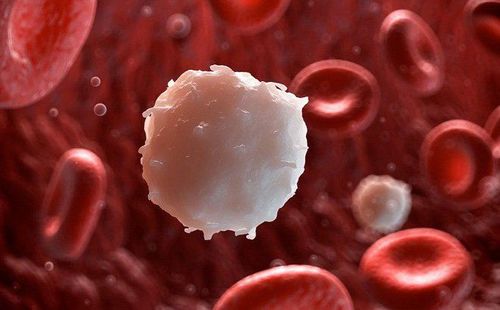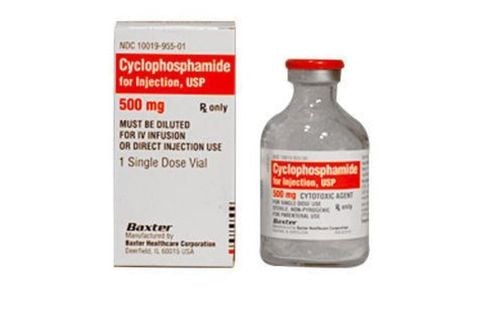This is an automatically translated article.
Dasatinib belongs to a group of anti-cancer drugs commonly used to treat certain cancers such as chronic granulomatous leukemia, acute lymphoblastic leukemia, when other cancer treatments are not effective. Dasatinib has the ability to inhibit tyrosine kinase to help slow or stop the growth of cancer cells.1. What is Dasatinib?
Dasatinib pharmacodynamically inhibits BCR-ABL kinase and SRC kinase activity along with several other selective oncogenic kinases, including c-KIT, ephrin receptor kinase (EPH), and PDGFb receptor . Dasatinib is a potent, sub-monopolar inhibitor of the BCR-ABL kinase with potency at 0.6-0.8 nm, thereby inhibiting the growth of cancer cells. Indications for Dasatinib include:In adults:
Chronic myeloid leukemia (CML) with Philadelphia chromosome positive (Ph + ) newly diagnosed in the chronic phase of the disease. Chronic CML in accelerated phase (blast phase) or flare phase with resistance or intolerance to prior therapy including imatinib. Ph+ acute lymphoblastic leukemia (ALL) and lymphoid flare CML with resistance or intolerance to previous therapy In children:
CML with Ph+ newly diagnosed in the chronic phase or resistant to, or intolerant of, prior therapy including imatinib. Newly diagnosed Ph+ ALL in combination with chemotherapy.
2. Dosage of the drug Dasatinib
Depending on the treatment goal, Dasatinib will be used in different doses, specifically as follows:
For the treatment of chronic myeloid leukemia (CML):
Starting dose: 100mgx 1 time/ If a hematological or cytological response is not achieved, increase the dose to 140 mg once daily. The recommended starting dose for flare-ups, myeloid acceleration or lymphoid CML or Ph+ ALL is 140 mg/day. If hematologic or cytological response is not achieved, the dose may be increased to 180 mg once daily. For the treatment of acute lymphoblastic leukemia Ph+ (ALL):
Initial dose: 140 mg once daily if hematologic or cytological response is not achieved, the dose may be increased to 180 mg once daily. /day. Dose adjustment when toxicity occurs: if hematologic toxicity occurs, temporarily discontinue dasatinib, reduce dose or discontinue drug. For children on Ph+ CML-CP and Ph+ ALL:
Dasatinib is given orally once daily as a film-coated tablet. The dose should be recalculated every 3 months based on the change in body weight of the child. Tablets are not recommended for children weighing less than 10kg Powder for oral suspension should be used for this audience Recommended dose for children 10-20kg: 40 mg/day Recommended dose for children 20-30kg: 60 mg/day Recommended dose for children 30-45 kg: 70 mg/day Recommended dose for children at least 45 kg: 100 mg/day
3. Dasatinib side effects
In some patients when using Dasatinib, side effects may occur such as:
Infection, marrow failure: fever, neutropenia, pneumonia, upper respiratory tract infection, herpes virus infection, infection blood. Appetite disturbance, increased uric acid Depression, headache, dizziness, neuropathy Visual disturbances, dry eyes Congestive heart failure, pericardial effusion, arrhythmia, palpitations, tinnitus , haemorrhage, hypertension Shortness of breath, pulmonary edema, pulmonary hypertension, pneumonia, cough Diarrhea, nausea, vomiting, abdominal pain, gastrointestinal bleeding, colitis, gastritis, mucositis Bone pain joint , muscle weakness, peripheral edema Generalized edema, weight gain
4. Be careful when using Dasatinib
Some general notes when using Dasatinib in treatment include:
Dasatinib can cause teratogenicity and embryo death, so avoid pregnancy while using Dasatinib for treatment. Use adequate contraception during treatment. Bone marrow failure is common and reversible with Dasatinib. The risk of serious bleeding, including potentially fatal central nervous system or gastrointestinal bleeding, is often associated with severe thrombocytopenia. Use with caution in patients taking anticoagulants or drugs that inhibit platelet function Risk of serious fluid retention causing pleural effusion, pericardial effusion, pulmonary edema, ascites, generalized edema Dear). Can be managed with diuretics, short-term corticosteroids Caution in hepatitis B patients using dasatinib Dasatinib may cause QT prolongation, caution should be used in patients with or may have QT prolongation . Correction of serum potassium or hypokalemia prior to administration of dasatinib Dasatinib may increase the risk of developing pulmonary arterial hypertension (PAH), which occurs at any time when treatment is initiated. If PAH is confirmed to require permanent medication Some common drug interactions of Dasatinib:
Active substances that increase Dasatinib blood levels: strong CYP3A4 inhibitors such as ketoconazole, itraconazole, erythromycin,... substances that reduce dasatinib plasma concentrations: drugs that induce CYP3A4 enzymes such as rifampicin, dexamethasone,... or histamine H2 antagonists and PPIs. The above is important information about Dasatinib, the correct use of the drug will bring the best benefits to the patient's health.
Please dial HOTLINE for more information or register for an appointment HERE. Download MyVinmec app to make appointments faster and to manage your bookings easily.













